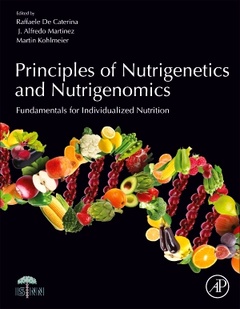Description
Principles of Nutrigenetics and Nutrigenomics
Fundamentals of Individualized Nutrition
Coordinators: De Caterina Raffaele, Martinez J. Alfredo, Kohlmeier Martin
Language: English
Subjects for Principles of Nutrigenetics and Nutrigenomics:
Keywords
?-3 Polyunsaturated fatty acids; 25-Hydroxyvitamin D; Absorption; Acetaldehyde; Adipose tissue; Adrenergic receptors; Affinity capture proteomics; Age-related macular degeneration; Alcohol dehydrogenase; Alcoholism; Algorithms; Allozyme; AMPK; Anticoagulation; ApaI; Appetite; Assumptions; Atherosclerosis; ATP; Bartter syndrome; Bioavailability; Bioinformatics; Biomarker discovery; Biomarkers; Biotin; Biotinidase; Blood cholesterol; Bone mineral density; Bone mineralization; Bone; Brain development; Brain-derived neurotrophic factor (BDNF)Eating behavior; Branched-chain fatty acids; Bsml; Caffeine; Calorie restriction; Candidate gene; Carbohydrate; Carcinogenesis; Cardiometabolic disease; Cardiorespiratory fitness; Cardiovascular disease; Cardiovascular diseases; Cardiovascular risk factor; Carotenoid cleavage oxygenases; Carotenoids; Case-control; Catechins; Chemoprevention; Chloride; Choline; ChREBP; Chromatin remodelers; Chromatin remodeling; Chronic kidney disease; Chronodisruption; Chyme; Circadian rhythm; Clinical utility; Cloud computing
586 p. · 21.4x27.6 cm · Hardback
Description
/li>Contents
/li>Biography
/li>Comment
/li>
Section 1: The biological basis of heritability and diversity 1. The nature of traits, genes and variation 2. Molecular biology of genetic variants 3. Regulation of Gene Expression4. The role of nutrition in DNA replication, DNA damage prevention and DNA repair 5. Genotyping and sequencing 6. RNA analyses 7. Methods in Nutrigenomics for precision nutrition8. Epigenetics: Methodology and tools for nutrition research 9. Proteomic analyses 10. Metabolomic analyses 11. Metagenomics12. A Broader View on Omics and Systems Biology 13. Study design in genomic epidemiology 14. Epistemology of nutrigenetic knowledge
Section 2: Nutrigenetics 15. Nutrigenetics and the early life origins of health and disease: effects of protein restriction 16. Perinatal nutrition 17. Epigenetics Mechanisms 18. Genetics of Chrononutrition 19. Newborn screening 20. Genomics of Eating Behavior and Appetite Regulation 21. Genetics of Body Composition: From Severe Obesity to Extreme Leanness 22. Genetic regulation of energy homeostasis: obesity implications 23. Genetic variations in the response to weight-loss diets 24. Genetic variations in the response to exercise: impact on physical fitness and performance25. Genetic variations impacting the response to defined diets 26. Carbohydrates 27. Monounsaturated and Saturated Fatty Acids28. Omega-3 and omega-6 fatty acids 29. Blood cholesterol 30. Genetic Individuality and Alcoholic Consumption31. Vitamin A and other carotenoids32. Vitamin D 33. Vitamin E 34. Vitamin K 35. Vitamins as Cofactors for Energy Homeostasis: Biotin, Thiamine and Pantothenic Acid 36. Vitamin C 37. Vitamin B2 38. Niacin39. Folate, vitamin B6, vitamin B1240. Choline 41. Electrolytes42. Iron 43. Trace elements44. Polyphenols and Nutrigenetic/Nutrigenomic Associations with Obesity-Related Metabolic Diseases45. Caffeine 46. Phytanic acid 47. Cognitive function48. Cardiovascular Disease49. Hemostasis and thrombosis 50. Diabetes mellitus 51. Bone health52. Nutrients and Genes in the Liver 53. Hyperuricemia and gout 54. Aging 55. Epigenetics in food allergies: the missing piece of the puzzle 56. Gut microbiota and their influence on the response to foods
Section 3: Nutrigenomics 57. Nutrients and Gene Expression in Development 58. Nutrients and gene expression in Obesity 59. Nutrients and gene expression in Diabetes 60. Gene expression in dyslipidemias 61. Nutrients and gene expression in Inflammation 62. Nutrients and gene expression in Cardiovascular Disease 63. Nutrients and Gene Expression in Cancer 64. Nutrients and Gene Expression Affecting Bone Metabolism
Section 4: Translational nutrigenetics and nutrigenomics 65. Nutrigenetics-based intervention studies 66. Genome-based nutrition guidance 67. Nutrigenomics of food pesticides68. Pharmaconutrigenetics: the impact of genetics on nutrient-drug interactions 69. Setting genome-directed guidelines and algorithms70. Direct-to-consumer services 71. Privacy risks and protective measures 72. Ethical considerations in nutrigenetics and nutrigenomics 73. Impact of Nutrigenetics and Nutrigenomics on Society
Prof. J. Alfredo Martínez has been involved in several landmark intervention trials and more than 50 national and international projects. He has supervised more than 70 PhD students and published more than 800 peer-reviewed manuscripts and book chapters in the areas of obesity and personalized nutrition, including precision nutritional omics. His works have been cited more than 26,000 times, and his HFactor is over 64. He has been President of the International Society of Nutrigenetics/Nutrigenomics (2015-2017) and is President of the International Union of Nutritional Sciences (IUNS) for the 2017-2021 period. Prof. Martínez has enjoyed training or invited stays at the University of Nottingham, Berkeley College, MIT, Harvard University, Oxford University, and King’s College London. He has been an advisor for EU Projects or a guest speaker or main keynote lecturer in important forums concerning precision nutrition in obesity and cardiometabolic diseases, including IUNS, ISNN, OMS, FAO, IAEA, NIH, SLAN, and FENS.
Dr. Martin Kohlmeier, MD, PhD, is a Professor of Nutrition; Director of the Human Research Core and the Nutrigenetics Laboratory at the UNC Nutrition Research Institute in Kannapolis, NC; Director of Nutrition in Medicine for online nutrition education of medical students and health professionals; visiting fellow of Wolfson College at




